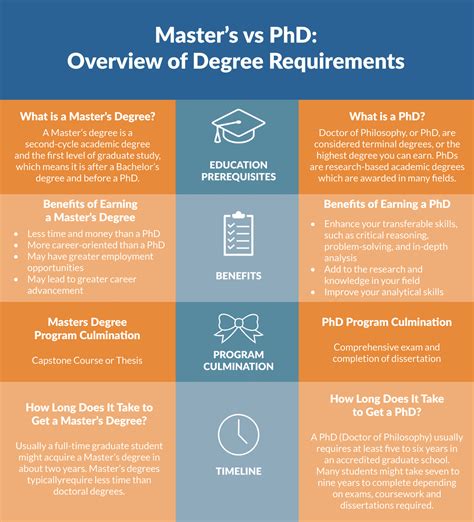Pursuing a PhD is a significant academic endeavor that requires careful consideration and planning. One important decision to make is whether to obtain a master’s degree before embarking on a doctoral program. This article explores the factors to consider when making this decision, providing insights from experts and data to help you make an informed choice.

Types of PhD Programs
PhD programs generally fall into two categories:
- Direct-Entry PhD: No master’s degree is required for admission. Students with a bachelor’s degree enter the doctoral program directly.
- PhD with Master’s: Students earn a master’s degree during the first 1-2 years of the PhD program. The master’s degree is typically required for entry into the doctoral phase.
Factors to Consider
The decision of whether to obtain a master’s before a PhD depends on several factors, including:
1. Field of Study: In some fields, such as medicine, law, and business, a master’s degree is typically required for admission to a PhD program. In other fields, such as the sciences and humanities, it is not always necessary.
2. Research Experience: Doctoral programs emphasize research skills and original contributions. Candidates with significant research experience may not need a master’s degree to demonstrate their abilities.
3. Career Goals: A master’s degree can provide specialized training and enhance career opportunities in certain fields, such as education, healthcare, or non-profit work. However, if your goal is primarily academia and research, a PhD may be the preferred path.
4. Personal Circumstances: Financial considerations, family obligations, and other personal factors may influence your decision. A master’s degree can provide financial support through teaching assistantships or research stipends.
Benefits of a Master’s Degree
- Research Foundation: A master’s program provides a solid foundation in research methods and critical thinking skills, which can be beneficial for PhD studies.
- Career Advancement: A master’s degree can enhance career prospects in fields like teaching, government, and industry.
- Networking: Pursuing a master’s degree allows you to connect with professors, researchers, and professionals who can provide valuable guidance and opportunities.
Drawbacks of a Master’s Degree
- Time and Cost: Obtaining a master’s degree typically takes 1-2 years and can be expensive.
- Opportunity Cost: Pursuing a master’s degree may delay your entry into a PhD program and the earning potential that comes with it.
- Unnecessary in Some Fields: For some disciplines, a master’s degree may not be necessary or may not provide significant advantages over a direct-entry PhD.
Statistics and Trends
According to the Council of Graduate Schools, approximately 40% of PhD students in the United States have a master’s degree. However, this percentage varies by discipline. In fields like education and social sciences, a master’s degree is more common, while in the sciences and engineering, direct-entry PhDs are more prevalent.
Data from the National Center for Science and Engineering Statistics (NCSES) shows that PhD graduates with a master’s degree tend to earn slightly higher salaries than those with only a bachelor’s degree. However, it is important to note that this difference may be due to other factors, such as years of experience or field of study.
Conclusion
The decision of whether to obtain a master’s degree before a PhD is a personal one. There is no one-size-fits-all answer. By carefully considering the factors discussed in this article, you can make an informed decision that aligns with your goals, circumstances, and field of study. Remember to seek guidance from academic advisors, professors, and experienced professionals to gain a comprehensive understanding of your options.
Table 1: Advantages and Disadvantages of a Master’s Degree before a PhD
| Advantage | Disadvantage |
|---|---|
| Research Foundation | Time and Cost |
| Career Advancement | Opportunity Cost |
| Networking | Unnecessary in Some Fields |
Table 2: PhD Programs with and without Master’s Requirements by Field
| Field | Direct-Entry PhD | PhD with Master’s |
|---|---|---|
| Medicine | No | Yes |
| Law | No | Yes |
| Business | Yes | Yes |
| Sciences | Yes | No |
| Humanities | Yes | No |
Table 3: Salary Trends for PhD Graduates with and without Master’s Degrees
| Degree | Median Salary |
|---|---|
| PhD with Master’s | $105,200 |
| PhD without Master’s | $102,500 |
| Master’s Only | $73,800 |
Table 4: Considerations for Making a Decision
| Factor | Questions to Ask Yourself |
|---|---|
| Field of Study | Does my field require a master’s degree? |
| Research Experience | Do I have sufficient research experience to demonstrate my abilities? |
| Career Goals | Will a master’s degree enhance my career prospects? |
| Personal Circumstances | Do I have financial or personal obligations that may influence my decision? |
